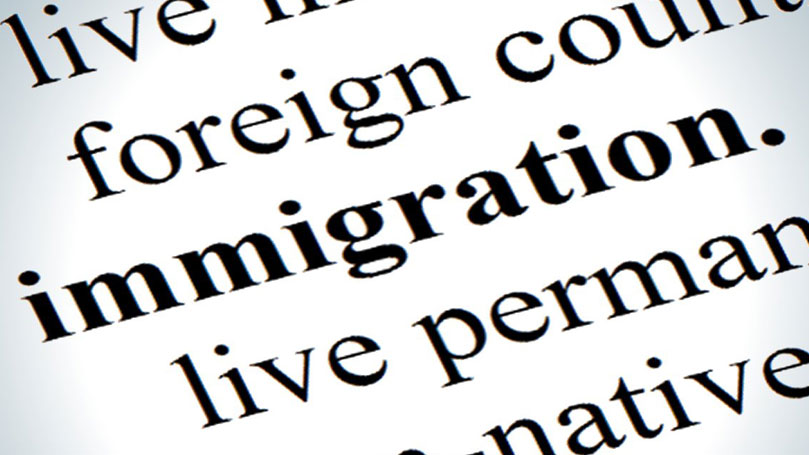
For decades, the CPUSA has been involved in the struggle for the rights of immigrant workers and their families. Recently, this struggle has been intensified by increased activity both of the immigrants and their labor and community supporters, and of anti-immigrant organizations. A central focus has been gaining legal rights for the 11 million undocumented.
Even on the “pro-reform” side, agendas clash. Business groups want to preserve or expand access to low cost immigrant labor. Labor wants to unionize immigrant workers so as to increase its own strength and stop the racket of using the precarious status of undocumented workers to undermine wages and working conditions. Electoral politicians want to get the votes of Latino and Asian American voters while not making themselves targets for the anti-immigrant right. The undocumented immigrants and their relatives and friends want an end to repression and the right to live in security and dignity, and to participate in all institutions of U.S. society.
So it should not surprise us that signals are crossed and mixed, and incoherent legislation is proposed which, simultaneously, proposes to help the undocumented (by legalization) while punishing them (branding them as criminals and imposing harsh new controls).
Our basic position is clear: Full rights for all workers and their families, immigrant and non-immigrant, an end to restrictive and repressive immigration policies (including Secure Communities, Operation Streamline, E-Verify etc.). We call for progressive legislation which legalizes as many people as possible as quickly as possible, and support the demand that the Obama administration stop its current fast pace of arrests and deportations, as it has done for the “Dreamers” (youth brought here without papers when they were minors). We are for ease of access to U.S. citizenship and we oppose guest worker programs.
These are positions held by most of the movement for immigrants’ rights and its labor, faith-based and other allies.
But there are some special perspectives which our party and people close to our Marxist politics bring to the struggle:
The understanding that mass labor immigration is a worldwide phenomenon, involving almost very developed or wealthy country.
The international movement of capital in search for profits, and related specific activities of our own government (NAFTA, CAFTA-DR and more to come) and other wealthy developed states underlie mass labor migration. Others may understand but dare not say so because they are afraid of being called unpatriotic, or are themselves compromised by their relationship with these corporate interests.
Poor workers and farmers come here mostly because the situations in their own countries give them no other choice. Working class undocumented immigrants come precisely from those countries tied most tightly to the United States by exploitative “free” trade agreements: Mexico, Central America, Haiti etc. In some cases instability and violence, again related to U.S. policy toward their countries (especially the “drug war”) constitute an additional motive.
They come here “undocumented”, or overstay temporary visas, because the United States will not give them permanent resident visas, as they are poor and don’t have technical skills U.S. businesses want. They have not “butted ahead in the line”, they have been forced to leave home by circumstances beyond their control, and there is no line for them to get into!
Undocumented immigrants; who return after having been deported, are not demonstrating moral turpitude or contempt for our laws, but, often, high ethical standards and a great sense of responsibility. They often have left destitute families including U.S. citizen spouses and minor children back in the United States without a breadwinner, and return to support their families, economically and emotionally. They know that this can lead to a long jail sentence.
There is a lack of understanding of what arrest and deportation of a breadwinner does to a family who has been living and working honestly in the United States. Even if those who are left behind are U.S. citizens, the mortgage is not paid, and the home is lost. The car payments lapse, so the vehicle is repossessed and with it, the remaining spouse’s job is lost because there is no way to get to work. Lives are turned upside down, and the emotional damage, especially to the children, is incalculable. None of this can be good for our economy, but it is also morally indefensible.
U.S. businesses get rich off the super-exploitation of undocumented immigrant workers because they can get away with paying them less. Undocumented workers do not dare to complain to government agencies about wages and hours violations; nor is it easy for them to join labor unions, for fear that someone will “turn them in”. But, thanks to tax cuts under Reagan and Bush, corporations that exploit undocumented workers do not pay anything like their fair share of taxes. Accusing undocumented immigrants of sponging off US taxpayers misses the point of who is contributing and who is a parasite. Like all workers, immigrants create the wealth which is expropriated by their exploiters.
The United States does not have an immigrant-friendly for working class and poor migrants. Legal immigration visas are given to people with specialized skills U.S. industry wants, or to rich foreigners who promise to set up “job creating” businesses here. Neither the United States nor any of the wealthy immigrant receiving countries have signed the main international treaty which attempts to create justice for economic migrants, the United Nations’ International Convention on the Protection of the Rights of Migrant Workers and Members of Their Families.
Neither Republican nor most Democratic Party politicians can fully embrace this sort of argument in pushing for immigration reform. Either they don’t agree with it or don’t understand it, or they fear being accused of being unpatriotic. Business groups favoring immigration reform are not going to say what we say either; nor are many not-profits which depend on corporate funding.
That is why the public debate on immigrants’ rights sometimes takes on such a nationalistic and narrowly business oriented tone (“what’s good for General Motors is good for the U.S.A.”), without any reference to the “push” factors in migration. How the issue of immigration, and especially undocumented immigration, relates to U.S. foreign and trade policy is completely ignored. So the average working American is allowed to believe that undocumented immigrants come to the United States out of either an admiration of our way of life or from “get rich quick greed”. The idea of immigrants as criminals and job thieves can thrive when there is no real understanding of these essential things.
Many working class immigrants themselves share much our perspective which often jibes with their personal experiences, as do an increasing number of labor and community leaders and activists, including top leaders in the AFL-CIO and specific unions. Nevertheless, business interests and their politician allies in the bourgeois media and blogosphere, and especially in Congressional hearing rooms often drown such voices out. The working class voice is muted by the usual means. Our Party and allies need to speak out more effectively.


 Join Now
Join Now